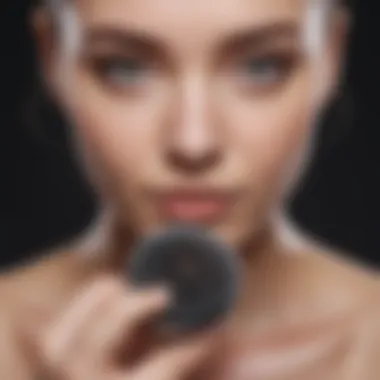Expert Tips for Banishing Ingrown Hairs in Intimate Areas


Fashion Trends & Style Guides
Ingrown hairs in intimate areas can be a persistent nuisance for individuals looking to achieve smooth and flawless skin. Managing and preventing ingrown hairs down there requires a delicate balance of proper care and techniques. This comprehensive guide delves into effective ways to tackle this common issue head-on, offering practical tips and insights to help you achieve bump-free skin effortlessly.
Beauty & Wellness
Exfoliation is Key
Proper exfoliation is crucial in preventing and treating ingrown hairs. By gently exfoliating the skin, you can remove dead cells and free up trapped hair, reducing the likelihood of ingrown hairs. Opt for a gentle exfoliating scrub or brush designed for sensitive areas to ensure optimal results.
Post-Hair Removal Care
After hair removal, whether through shaving, waxing, or using depilatory creams, it is essential to follow up with adequate post-care. Applying a soothing and antibacterial cream can help reduce inflammation and the risk of ingrown hairs. Moreover, avoiding tight clothing that can rub against the skin post-hair removal can aid in preventing irritation.
Pop Culture & Entertainment
While the topic of ingrown hairs may not always be in the spotlight of popular culture, the quest for smooth and bump-free skin is a universal aspiration. Whether in the realms of Hollywood glamour or everyday beauty routines, individuals seek effective solutions to address ingrown hairs down there. By following the tips and techniques outlined in this guide, you can achieve skin that is not only healthy but also radiant.
Politics & Social Commentary
The issue of ingrown hairs might seem trivial in the grand scheme of societal challenges; however, the impact on one's self-esteem and confidence should not be underestimated. By addressing and resolving ingrown hairs effectively, individuals can feel more comfortable and confident in their own skin, contributing to a positive self-image and overall well-being.
Understanding Ingrown Hairs
Ingrown hairs are a ubiquitous concern among individuals, especially in delicate areas. This section delves into the intricate details surrounding the causes, identification, prevention, and treatment of ingrown hairs. Understanding the underlying factors contributing to ingrown hairs is vital for effective management.
What Causes Ingrown Hairs?
Hair Curvature


Hair curvature plays a pivotal role in the development of ingrown hairs. The distinctive curvature of hair strands influences how they grow back into the skin after shaving or waxing. This unique feature of hair curvature increases the likelihood of hairs becoming trapped beneath the skin's surface, leading to ingrown hairs. While curly hair is aesthetically pleasing, it is more prone to this issue compared to straight hair due to its bending pattern.
Improper Hair Removal Techniques
The technique used for hair removal significantly impacts the likelihood of ingrown hairs. Improper methods like frequent shaving against the hair growth direction, using dull razors, or waxing improperly can contribute to hair follicles becoming trapped beneath the skin. Addressing these improper techniques is crucial to reducing the risk of ingrown hairs and maintaining healthy skin.
Dead Skin Cells
Accumulation of dead skin cells on the skin's surface can obstruct the natural hair growth pattern, leading to ingrown hairs. When dead skin cells clog the hair follicles, newly growing hair strands may struggle to penetrate through the skin, resulting in ingrown hairs. Proper exfoliation and skin care routines are essential to prevent the build-up of dead skin cells and promote healthy hair growth.
Identifying Ingrown Hairs
Symptoms
Recognizing the symptoms of ingrown hairs is imperative for timely intervention. Common symptoms include redness, swelling, itching, and pain in the affected area. Understanding these symptoms helps in distinguishing ingrown hairs from other skin issues, facilitating targeted treatment approaches.
Distinguishing from Other Bumps
Distinguishing ingrown hairs from other skin bumps is essential for accurate diagnosis and treatment. While ingrown hairs typically have a hair visible beneath the skin's surface, other bumps like cysts or pimples may not exhibit such characteristics. Learning to differentiate between these conditions aids in selecting appropriate treatment methods and ensuring effective resolution.
Preventive Measures
Preventive measures play a pivotal role in tackling ingrown hairs efficiently. In this article, understanding the significance of preventive measures is key to maintaining smooth and bump-free skin in sensitive areas. By emphasizing proper exfoliation techniques, moisturizing, and clothing choices, individuals can proactively prevent the occurrence of ingrown hairs. Implementing preventive measures not only helps in avoiding ingrown hairs but also contributes to overall skin health.
Proper Exfoliation Techniques
Proper exfoliation techniques are essential for preventing ingrown hairs effectively. When it comes to exfoliation, gentle scrubs serve as a crucial component in sloughing off dead skin cells and preventing hair follicles from getting trapped. The key characteristic of gentle scrubs lies in their mild exfoliating properties, making them suitable for sensitive areas. By utilizing gentle scrubs, individuals can achieve smooth and radiant skin without causing irritation or inflammation.
Exfoliating Gloves
Integrating exfoliating gloves into a skincare routine can enhance the overall exfoliation process. Exfoliating gloves aid in thorough yet gentle exfoliation, offering a physical exfoliation method that effectively removes dead skin cells and unclogs pores. The unique feature of exfoliating gloves is their textured surface, which provides a tactile experience while exfoliating the skin. By using exfoliating gloves, individuals can achieve a deeper exfoliation that promotes skin renewal and prevents ingrown hairs.


Chemical Exfoliants
Chemical exfoliants bring a different approach to exfoliation, utilizing active ingredients to dissolve dead skin cells and promote cell turnover. The key characteristic of chemical exfoliants is their ability to target specific skin concerns, such as ingrown hairs, through gentle yet effective exfoliation. Choosing the right chemical exfoliant based on skin type and sensitivity is crucial to prevent irritation and achieve desired results. While chemical exfoliants offer advanced exfoliation benefits, it is essential to follow usage instructions carefully to prevent adverse reactions.
Moisturizing for Prevention
Incorporating moisturizing products into a skincare regimen is vital for preventing ingrown hairs. Hydrating ingredients such as aloe vera and hyaluronic acid help maintain skin hydration levels, reducing the likelihood of hair ingrowth. The key characteristic of hydrating ingredients is their ability to nourish the skin and create a protective barrier that prevents irritation. By using moisturizing products like post-shave balms, individuals can promote skin healing, soothe inflammation, and minimize the risk of developing ingrown hairs.
Post-Shave Balms
Post-shave balms offer a lightweight and soothing solution for moisturizing skin after hair removal. The unique feature of post-shave balms is their fast-absorbing formula, which helps calm skin sensitivity and redness post-shaving. Incorporating post-shave balms into a skincare routine provides hydration without greasiness, making them an ideal choice for individuals prone to ingrown hairs. By applying post-shave balms regularly, individuals can maintain skin moisture levels and reduce the occurrence of ingrown hairs.
Choosing Suitable Clothing
Selecting appropriate clothing plays a significant role in preventing ingrown hairs and maintaining skin health. Breathable fabrics such as cotton allow proper air circulation, reducing sweat and friction that can contribute to ingrown hairs. The key characteristic of breathable fabrics is their lightweight and moisture-wicking properties, ensuring comfort and skin breathability. Opting for loose-fitting attire further minimizes skin irritation and restrictiveness, promoting better airflow and preventing ingrown hairs. By incorporating breathable fabrics and loose-fitting attire into daily wear, individuals can create a conducive environment for healthy skin and reduce the risk of ingrown hairs.
Treatment Options
In the realm of dealing with ingrown hairs in intimate areas, exploring different treatment options holds paramount significance. Identifying appropriate methods to address this common issue can drastically improve one's skin health and overall well-being. By taking proactive steps to combat ingrown hairs, individuals can achieve smoother, bump-free skin, enhancing their comfort and confidence.
Home Remedies
Warm Compress
Delving into the realm of home remedies, the utilization of a warm compress stands out as a particularly effective approach in managing ingrown hairs. The gentle application of heat aids in opening up pores and soothing irritated skin, facilitating the natural process of hair release. This method promotes skin healing and reduces inflammation, offering a soothing and comforting experience for individuals grappling with ingrown hairs.
Tea Tree Oil
Turning attention to the virtues of tea tree oil in the context of dealing with ingrown hairs, its antibacterial and anti-inflammatory properties play a crucial role. Tea tree oil not only helps alleviate redness and swelling associated with ingrown hairs but also assists in preventing infections. Its natural essence provides a gentle yet potent solution for treating ingrown hairs effectively, showcasing its prominence as a popular choice among individuals seeking natural remedies.
Aloe Vera Gel


Exploring the merits of aloe vera gel as a remedy for ingrown hairs reveals its exceptional soothing and healing characteristics. Aloe vera's cooling properties help reduce skin irritation and promote moisture retention, aiding in the restoration of skin health. Its gentle nature makes it suitable for sensitive skin, offering a refreshing and calming effect. However, individuals must be cautious of potential allergies or sensitivities when using aloe vera gel, highlighting the importance of patch testing before widespread application.
Professional Interventions
Dermatologist Consultation
Within the spectrum of professional interventions for ingrown hairs, seeking guidance from a dermatologist emerges as a pivotal step in effective management. Dermatologists possess specialized knowledge and expertise in diagnosing and treating various skin conditions, including persistent ingrown hairs. Through a personalized consultation, individuals can receive tailored recommendations and potential medical interventions, leading to long-term resolution of ingrown hair concerns.
Laser Hair Removal
Scrutinizing the realm of advanced treatments for ingrown hairs, laser hair removal emerges as a groundbreaking solution. This innovative procedure targets hair at the root, inhibiting future growth and minimizing the likelihood of ingrown hairs. By undergoing laser hair removal sessions under professional supervision, individuals can achieve lasting results, enjoying smoother skin and reduced ingrown hair occurrences. However, individuals should consider factors such as skin type and hair color when deliberating this treatment option, as personalized assessment plays a crucial role in determining its efficacy.
Post-Treatment Care
Importance of Post-Treatment Care in This Article
Be prepared to venture into the critical realm of post-treatment care, a crucial segment in addressing ingrown hairs in delicate regions. This part is indispensable, offering essential insights into nurturing your skin post-hair removal. By delving into the nuances of post-treatment care, you equip yourself with the knowledge to maintain optimal skin health. Understanding the significance of this phase ensures a seamless journey towards a smooth and flawless skin texture post-hair removal.
Avoiding Irritants
Harsh Chemicals
Exploring the realm of harsh chemicals, we confront a pertinent element influencing the overall battle against ingrown hairs. These substances possess a notable trait - their ability to aggravate skin sensitivity, potentially exacerbating ingrown hairs. While commonly used in various skincare products, their harsh nature can pose challenges when combating this issue. The unique characteristic of harsh chemicals lies in their potent formulation, which can either aid or hinder the skin's recovery process. Balancing their benefits and drawbacks is crucial in determining their suitability within the context of this article.
Tight Clothing
Embark on a discourse centered around the impact of tight clothing on our quest for ingrown hair eradication. Tight apparel plays a significant role in this narrative by exerting pressure on the skin, potentially triggering or worsening ingrown hairs. Its key attribute of snugness, although fashionable, may inadvertently contribute to skin irritation. Understanding the friction tight clothing generates sheds light on its role in impeding the skin's healing process. Evaluating the pros and cons of wearing tight attire in the context of ingrown hair management is pivotal for devising a comprehensive prevention strategy.
Regular Monitoring
Observing Healing Progress
Dive into the realm of tracking the healing progress, an integral aspect of managing ingrown hairs effectively. Observing how your skin evolves post-treatment is vital for gauging the efficacy of your chosen remedies. The primary allure of this practice lies in its ability to provide real-time feedback on your skin's response to treatment. This proactive approach enables you to adjust your skincare routine accordingly, optimizing your chances of achieving a bump-free complexion. Understanding the advantages and potential limitations of closely monitoring your skin's healing journey is essential for maintaining skin health.
Seeking Professional Help if Needed
Transition into the realm of seeking professional assistance when addressing ingrown hairs becomes challenging. Understanding when to enlist expert guidance is crucial in ensuring effective treatment and prevention. The pivotal characteristic of this recourse is its ability to offer personalized solutions tailored to your skin's unique needs. Opting for professional help presents a blend of advantages and potential drawbacks, influencing its role in complementing your existing skincare regime. By weighing the pros and cons of seeking professional intervention, you empower yourself to make informed decisions towards conquering ingrown hairs effectively.







